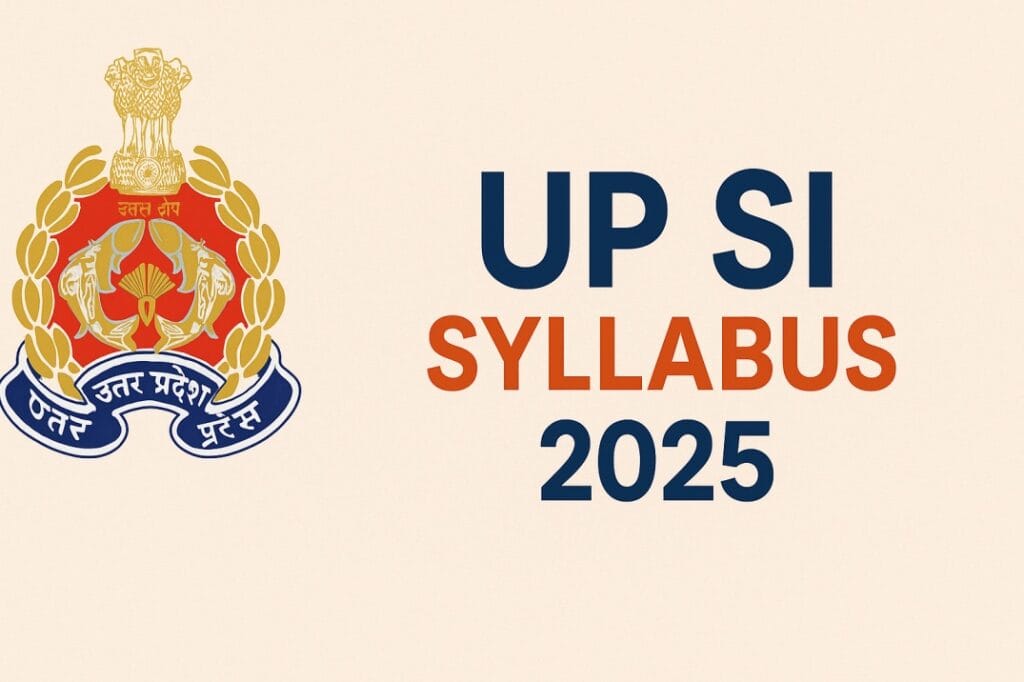📅 Published on: 13.08.2025
Table of Contents
ToggleSYLLABUS OF UP SI 2025: Complete Subject-Wise Syllabus

If you are preparing for the Uttar Pradesh Police Sub-Inspector (UP SI) Recruitment 2025, understanding the latest syllabus and exam pattern is the first step towards success. The UP SI exam is highly competitive, with thousands of aspirants appearing every year for a limited number of posts. In this article, we bring you a detailed subject-wise syllabus along with the exam pattern, so you can plan your preparation effectively.
UP SI Exam Pattern 2025
The UP SI exam is conducted online in a Computer-Based Test (CBT) format. Here’s the updated exam structure:
Subject | Marks | Number of Questions | Time Duration |
General Hindi | 100 | 40 | 2 Hours (120 Minutes) |
Law/Constitution & General Knowledge | 100 | 40 | |
Numerical & Mental Ability Test | 100 | 40 | |
Mental Aptitude Test / Intelligence / Reasoning | 100 | 40 | |
Total | 400 | 160 | |
Key Points:
- Each question carries 2.5 marks.
- No negative marking.
- Candidates must score 35% in each section and overall 50% to qualify for the next stage.
SYLLABUS OF UP SI 2025 – Subject-Wise
1. General Hindi

2. Law/Constitution & General Knowledge
इस खंड में भारतीय न्याय संहिता (BNS) एवं भारतीय नागरिक सुरक्षा संहिता (BNSS), महिलाओं, बच्चों, अनुसूचित जाति के सदस्यों आदि के संरक्षण हेतु विधिक प्रावधान, यातायात नियम, पर्यावरण संरक्षण, वन्यजीव संरक्षण, मानवाधिकार संरक्षण, सूचना का अधिकार अधिनियम, आयकर अधिनियम, भ्रष्टाचार निवारण अधिनियम, राष्ट्रीय सुरक्षा अधिनियम, आईटी अधिनियम, साइबर अपराध, जनहित याचिका, महत्वपूर्ण न्यायिक निर्णय, भूमि सुधार, भूमि अधिग्रहण और भू-राजस्व संबंधी कानूनों का सामान्य ज्ञान शामिल है।
इसके अतिरिक्त, संविधान का उद्देश्य, मौलिक अधिकार, नीति निदेशक तत्व एवं मूल कर्तव्य, संसदीय व्यवस्था, केंद्र एवं राज्य सरकारों का गठन एवं अधिकार, कानून बनाने का अधिकार, स्थानीय शासन, केंद्र और राज्यों के बीच संबंध, निर्वाचन तथा अन्य महत्वपूर्ण संवैधानिक जानकारी, अखिल भारतीय सेवाएं एवं उनकी चयन प्रक्रिया आदि पर भी प्रश्न पूछे जाएंगे।
सामान्य विज्ञान, स्वास्थ्य एवं स्वास्थ्य विज्ञान, भारत का इतिहास, स्वतंत्रता संग्राम, भारतीय अर्थव्यवस्था एवं संस्कृति, भारतीय कृषि, वाणिज्य एवं व्यापार, जनसंख्या, पर्यावरण एवं नगरीकरण, एफडीआई (Foreign Direct Investment), विश्व भूगोल, भारत का भूगोल एवं प्राकृतिक संसाधन, राष्ट्रीय और अंतरराष्ट्रीय महत्व के समसामयिक विषय, उत्तर प्रदेश की शिक्षा, संस्कृति और सामाजिक प्रथाएं, राजनीति, पुलिस एवं सामान्य प्रशासनिक व्यवस्था, भारत और उसके पड़ोसी देशों के संबंध, कंप्यूटर ज्ञान, सूचना एवं संचार प्रौद्योगिकी का मौलिक एवं आधारभूत ज्ञान, और सोशल मीडिया कम्युनिकेशन भी इस खंड में शामिल हैं।
- Indian Justice Code (BNS) and Indian Civil Security Code (BNSS)
- Laws related to the protection of women, children, and Scheduled Castes members
- Traffic rules
- Environmental conservation
- Wildlife protection
- Human rights protection
- Right to Information Act
- Income Tax Act
- Prevention of Corruption Act
- National Security Act
- IT Act
- Cybercrime
- Public Interest Litigation
- Important judicial decisions
- Land reforms
- Land acquisition
- General knowledge of laws related to land and state
- Constitution: objectives, fundamental rights, directive principles of state policy, and fundamental duties
- Parliamentary system
- Structure and powers of central and state governments
- Law-making rights
- Local governance
- Relations between Centre and States
- Elections
- Constitutional amendments
- All India Services and their selection process
- General science
- Health and health science
- History of India
- Indian freedom struggle
- Indian economy and culture
- Indian agriculture
- Trade and commerce
- Population
- Environment and urbanization
- FDI (Foreign Direct Investment)
- World geography and Indian geography
- Natural resources
- National and international current affairs
- Education, culture, and social practices of Uttar Pradesh
- Administrative system of Uttar Pradesh
- Police and general administration of Uttar Pradesh
- Relations between India and its neighboring countries
- Computer skills and basic knowledge
- Basic and advanced knowledge of information and communication technology
- Social media communication
HSSC Stenographer Previous Year Paper – PDF Download
3. Numerical & Mental Ability Test
Number System, Simplification, Decimals and Fractions, Highest Common Factor (HCF) and Lowest Common Multiple (LCM), Ratio and Proportion, Percentage, Profit and Loss, Discount, Simple Interest, Compound Interest, Partnership, Average, Time and Work, Time and Distance, Use of Tables and Graphs, Mensuration, Arithmetical computations, other analytical functions, and miscellaneous topics.
The mental ability part includes Logical Diagrams, Symbol-Relationship Interpretation, Perception Test, Word Formation Test, Letter and Number Series, Word and Alphabet Analogy, Common Sense Test, Direction Sense Test, Logical Interpretation of Data, Forcefulness of Argument, and Determining Implied Meanings.
इस खंड में गणितीय और मानसिक क्षमता से जुड़े प्रश्न पूछे जाते हैं। गणित भाग में संख्या पद्धति, सरलीकरण, दशमलव और भिन्न, महत्तम एवं लघुत्तम समापवर्तक, अनुपात और समानुपात, प्रतिशत, लाभ और हानि, छूट, साधारण ब्याज, चक्रवृद्धि ब्याज, भागीदारी, औसत, समय और कार्य, समय और दूरी, सारणी एवं ग्राफ का प्रयोग, क्षेत्रमिति (Mensuration), अंकगणितीय संगणना और अन्य विश्लेषणात्मक कार्य, तथा विविध विषयों से संबंधित प्रश्न शामिल होते हैं।
मानसिक योग्यता भाग में तार्किक आरेख, संकेत-संबंध व्याख्या, प्रत्यक्ष ज्ञान बोध, शब्द रचना परीक्षण, अक्षर और संख्या श्रृंखला, शब्द एवं वर्णमाला में आंशिक समानता, सामान्य ज्ञान परीक्षण, दिशा ज्ञान परीक्षण, आंकड़ों का तार्किक विश्लेषण, प्रभावी तर्क, तथा अंतर्निहित भावों का निर्धारण करने से संबंधित प्रश्न पूछे जाते हैं।
4. Mental Aptitude Test / Intelligence / Reasoning
- Relationship and Analogy Test
- Spotting the Dissimilar
- Series Completion Test
- Coding and Decoding Test
- Direction Sense Test
- Blood Relation
- Problem Based on Alphabet
- Time Sequence Test
- Venn Diagram and Chart Type Test
- Mathematical Ability Test
- Arranging in Order
- Analogies
- Similarities
- Differences
- Space Visualization
- Problem Solving
- Analysis Judgement
- Decision Making
- Visual Memory
- Discrimination Ability
- Observation
- Relationship
- Concepts
- Arithmetical Reasoning
- Verbal and Figure Classification
- Arithmetical Number Series
- Ability to Deal with Abstract Ideas and Symbols and Their Relationships
Preparation Tips for UP SI Exam
1. Make a Timetable
A well-structured timetable helps you divide your daily study hours effectively across all four subjects. Allocate more time to difficult topics while ensuring regular practice of strong areas to maintain balance.
2. Practice Mock Tests
Attempting regular mock tests simulates the real exam environment, improves speed, and enhances accuracy. Analyze each test to identify mistakes and adjust your preparation strategy for better performance in future attempts.
3. Focus on Weak Areas
Identify subjects or topics where you consistently score low and prioritize them in your study plan. Practice these topics regularly to turn weaknesses into strengths before the actual examination day.
4. Stay Updated
Keep yourself updated with daily news, current affairs, and recent events, especially related to Uttar Pradesh and India. This habit boosts your General Knowledge and helps you tackle unpredictable GK questions confidently.
5. Revise Regularly
Consistent revision is key to retaining concepts and formulas. Schedule weekly revision sessions for all subjects, ensuring no topic is left untouched, thus improving memory recall during the actual examination.



